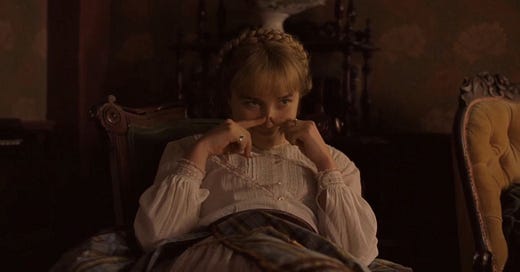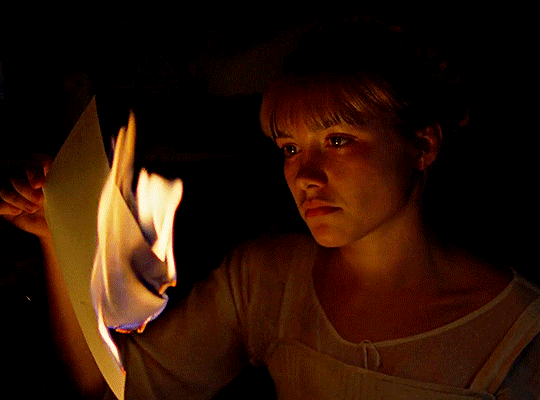To be perfectly honest, after my first time seeing the story of Little Women unfold, I was immensely conflicted on whether or not I liked Amy March. It seems the age old question of Little Women readers and watchers alike. How you feel about the 13 year old blonde is quite the conversation starter, and those who choose to identify with her are often ridiculed or met with confusion. I mean, I’m definitely more of a Jo myself; a messy haired writer with bold opinions and a temper to match. At the same time however, I see myself reflected in Amy; her relentless ambition, often coupled with extensive self doubt. I am two sides to a coin that people so often wish to split in half. So, while I’ve never been quite able to understand the outright hatred for Amy, to an extent, I get it.
She isn’t gentle and soft-spoken like Beth, motherly and kind like Meg, or daring and loyal like Jo. She is possibly the easiest March sister to dislike. In her initial scenes, she’s a bratty child, and as she ages, she falls in love with the man we are meant to believe Jo is set to wed (although we’re Lesbian Jo March Truthers™ around here). She is in a way, an antagonist to Jo’s protagonist. She’s the one who sets the story a few steps back just as we’ve seemingly progressed forward.
But perhaps Amy March isn’t meant to be the most beloved, perhaps she’s merely meant to be understood.
Maybe it’s because Greta Gerwig’s almost Amy-centric rendition of the story was the first I became attached to, or maybe it’s because I absolutely adored what Florence Pugh brought to the role, but to me, there’s always been something more to Amy March. There’s a sense of energy within her that I noticed the first time she graced my screen, a spark I felt as I read her first lines in Louisa May Alcott’s original novel. The ability to bring these characteristics to life are some of what I love so much about Gerwig’s adaptation. She justifies Amy’s actions in a way that few before her were capable of. She gives her a sense of agency that helps us not to excuse her missteps, but comprehend why they were taken.
Which leads me to the thing that’s always gotten me about those who can’t stand the youngest March sister; when it comes down to it, what’s really to hate? Because, if you sit down and read the source material, Amy’s concerns make sense, especially considering the time period she’s placed in. She’s meant to be the one to care for her poor family as Meg chooses to marry a “penniless tutor”, Beth deals with illness, and Jo is seen as a “lost cause”. She sees herself torn between the woman she wants to be; a respected and accomplished artist, and the woman she is forced to be; a dutiful wife to a wealthy man. All that considered, I firmly believe that Amy March is somewhat justified in her unbridled rage.
To that, I’m not saying I personally would choose to burn my sister’s manuscript. In fact, as a self-proclaimed “Jo March”, that scene physically pains me, as much as it makes me giggle at it’s absurdity. And I know, to the fellow Jo’s out there, that it’s salt in the wound to see her engage and marry Laurie, the boy next door, who’s supposed to be Jo’s. Yet at the same time, I understand that Amy is merely a child when she makes her rash decision to burn the novel. As for marrying Laurie, she’s able to realize that the sister she loves dearly is not in the slightest interested in the boy she has loved for ages. She sees an opportunity to marry someone who can both benefit her financially, and whom she loves, and she takes it. I don’t think she should be shamed for that either. In fact, I believe if the story was told from her perspective, we’d universally adore and root for her; a young girl spending her life pining for a boy who refuses to see her, but when he eventually does, they both realize that they’re meant for one another.
Beyond that, are we not allowed to change, and grow, and become more than we once were? If your answer to the proposed is that we’re allowed to do so, why shouldn’t Amy March be allowed to share in the joy and freedom of that growth? Should she not be allowed to become more than the somewhat spoiled youngest sibling figure she is in her introductory scenes?
All in all, Amy March, to me, is one of the most complex female characters of her time. She’s a daughter who puts too much pressure on herself, an artist who thinks everything she creates isn’t good enough. She’s a hater of her nose, and a lover of pickled limes. She’s an eager and bold child. She’s an independent and strong-minded woman. But above all else, she’s a young girl, trying to find her place in the world, much like her sisters. Perhaps we don’t like her because we see a bit too much of ourselves, or our sisters, or our daughters, or our mothers in her. Because, she is, in her very heart, a depiction of the women that we are and the women that we wish to become.
syd








as the youngest daughter, i agree. beautiful piece as always!
Had to make an account on here after seeing the snippet on bookstagram, Loved loved this review!!